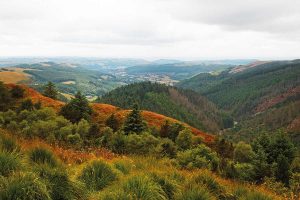The Call of Nature: Faith, Flora, and Ecological Exploration in the Islamic Context
As a city dweller with limited exposure to nature beyond my family’s allotment, attending a residential ecological fieldwork trip in a remote corner of Wales as a teen felt like stepping into an entirely different realm. This experience not only deepened my appreciation for the natural world but also ignited a lasting interest in sustainability.
Years later, I had the honour of returning to this transformative journey as a mentor for the British Ecological Society’s undergraduate summer school. I was thrilled at the prospect of sharing my knowledge and enthusiasm with the next generation of aspiring ecologists. Guiding students through engaging discussions and hands-on activities allowed me to highlight the beauty and complexity of our natural environment. This opportunity not only enhanced my understanding of ecology but also reinforced the Islamic values of stewardship and respect for nature.
One of the highlights of the summer school was leading a session on climate policy and finance. It was fascinating to see how interconnected our ecological systems are, much like the teachings of Islam that remind us of the delicate balance within creation. In Surah Al-Anfal (8:60), we are encouraged to prepare ourselves and our communities, which can be understood as a call to protect our environment and ensure its sustainability for future generations. This sentiment resonates with the verse from Surah Al-An’am (6:38), which states, “There is no animal that crawls on the earth, no bird that flies with its two wings, but are communities like you.” This verse beautifully illustrates the interconnectedness of all living beings, reminding us that we share this planet with diverse forms of life, each playing a vital role in the ecological tapestry.
Throughout the summer school, I engaged with experts from various fields, discussing topics ranging from regenerative agriculture to riverine ecology. One of my proudest moments was when my mentor group delivered the winning presentation, showcasing our insights from the 2023 State of Nature report tailored for tourists and recreational users. This experience illuminated the importance of effective science communication, a skill that can bridge the gap between ecological knowledge and public understanding.
Ecological fieldwork is not just for scientists; it’s accessible and enjoyable for everyone, including families with children. During the summer school, we practiced a variety of skills that showcased the fun side of ecology. From kick sampling and identifying freshwater invertebrates to mapping using QGIS, each activity was a reminder that learning about our environment can be an engaging adventure.
If you’re interested in ecology, I encourage you to explore field studies centres, which often offer workshops and activities ideal for families. These hubs provide a hands-on approach to learning about biodiversity, demonstrating that there is much more to ecology than simply throwing quadrats. For anyone ready to roll up their sleeves and get involved, here are some next steps to kickstart your ecological journey:
- Check Out Local Events: Keep an eye on community boards or social media for upcoming wildlife events. Whether it’s a bat watch, a river clean-up, or a guided nature walk, these activities are a fantastic way to learn and connect with nature. Websites like Wildlife Trusts often list local events.
- Join Workshops: Organisations like the Wildfowl & Wetlands Trust (WWT) offer workshops on everything from birdwatching to wetland conservation. You’ll not only learn valuable skills but also meet fellow nature enthusiasts.
- Volunteer: Look for local conservation projects that need a helping hand. Volunteering can be a rewarding way to contribute while developing skills you didn’t even know you needed. Plus, it’s a great excuse to get outside and enjoy the fresh air!
- Explore Nature Reserves: Take a family trip to a nearby nature reserve or park. Spend the day observing wildlife, and maybe even bring a field guide to identify plants and animals. It’s a perfect way to bond with loved ones while nurturing a love for the environment.
- Engage in Citizen Science: Participate in citizen science initiatives like the RSPB’s Big Garden Birdwatch or Nature’s Calendar. These projects allow you to contribute valuable data while enjoying time outdoors. It’s like being a scientist without the lab coat (or the lab)!
In conclusion, my experience at the British Ecological Society’s summer school was a powerful reminder of how intertwined our faith and the natural world are. As we engage with ecology, let us remember our responsibility to protect and cherish the earth, reflecting the principles of stewardship that Islam teaches us. By nurturing our connection to nature, we can cultivate a deeper understanding of our faith and the beauty of creation.
And here’s a fun fact: there’s actually a bacterium in soil called Mycobacterium vaccae that can help release serotonin in our brains! It’s amazing how our interactions with nature can have such a positive effect on our mood and well-being.

By Jubaydah